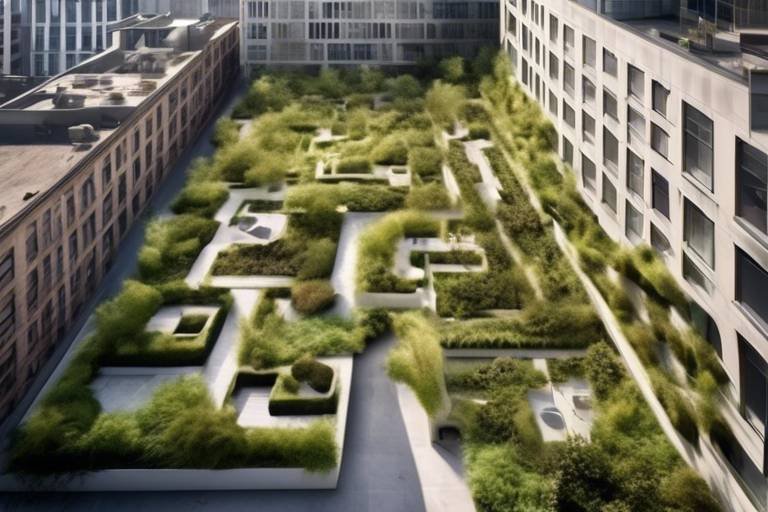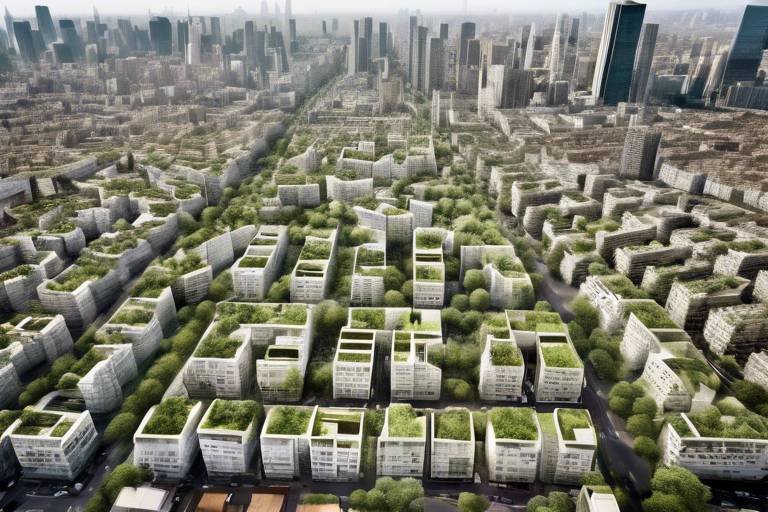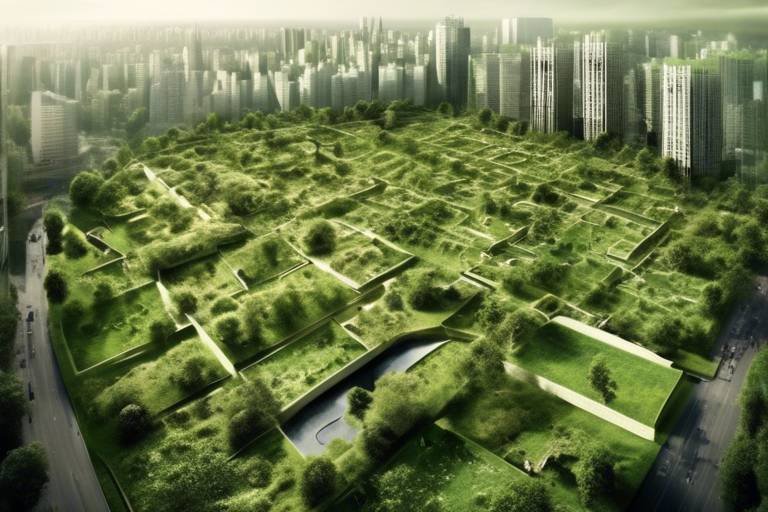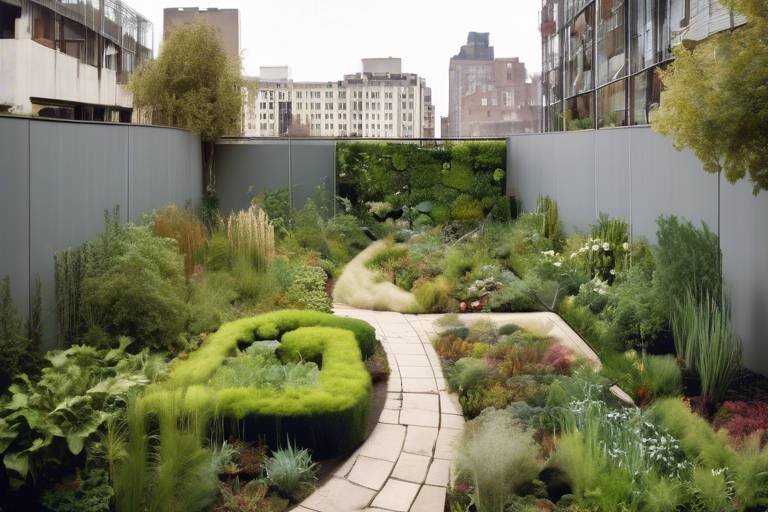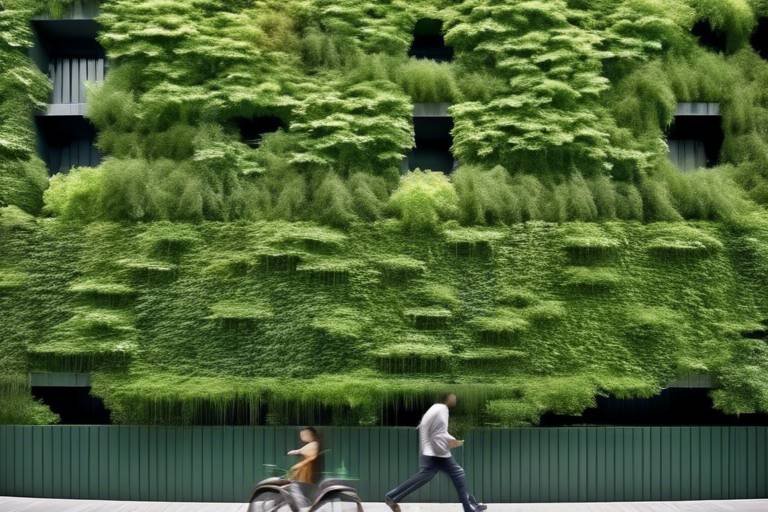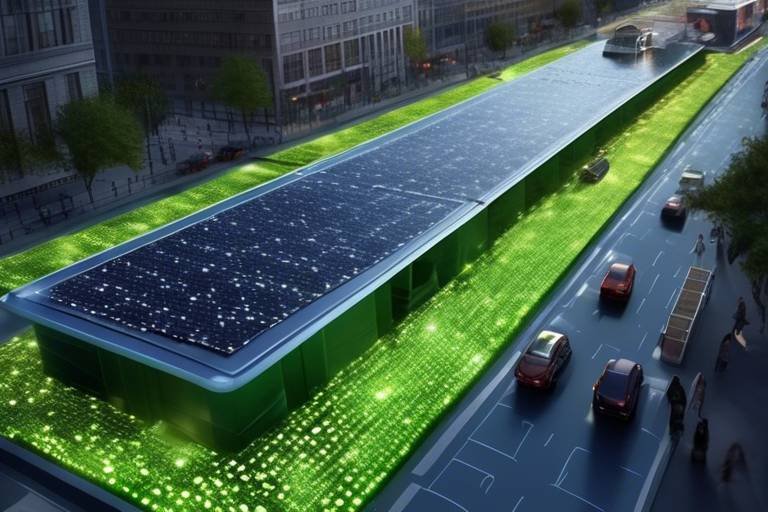The Importance of Urban Beekeeping for Biodiversity
Urban beekeeping is more than just a trendy hobby; it's a vital practice that can significantly enhance biodiversity in our cities. As urban areas expand and natural habitats shrink, the role of bees becomes even more crucial. These tiny pollinators are responsible for the reproduction of a vast majority of flowering plants, including many of the crops we rely on for food. By keeping bees in urban settings, we not only support their populations but also create a ripple effect that benefits the entire ecosystem.
Imagine walking through a vibrant city filled with blooming flowers, lush community gardens, and thriving local farms. This is the vision that urban beekeeping helps to bring to life. Not only does it contribute to the health of the bee populations, but it also fosters connections among community members, encourages environmental stewardship, and promotes a deeper understanding of our interconnectedness with nature. In essence, urban beekeeping is a bridge that links city dwellers to the natural world, reminding us of the essential role biodiversity plays in our everyday lives.
Furthermore, urban beekeeping has a profound impact on the local food system. With bees buzzing from flower to flower, pollination rates increase, leading to higher yields in urban gardens and farms. This not only boosts food security but also enhances the diversity of produce available to city residents. When urban beekeepers engage in this practice, they create a sustainable food source that can nourish their communities while also reducing the carbon footprint associated with transporting food over long distances.
In addition to the ecological benefits, urban beekeeping serves as a powerful educational tool. It opens the door for discussions about sustainability, conservation, and the importance of protecting pollinators. Schools, community centers, and local organizations can leverage urban beekeeping initiatives to teach individuals, especially children, about the delicate balance of ecosystems and the significance of every species, no matter how small. By fostering a sense of responsibility towards the environment, urban beekeeping cultivates a generation of informed citizens who are ready to advocate for biodiversity.
As we look towards the future, the importance of urban beekeeping cannot be overstated. It is a practice that not only supports biodiversity but also enriches urban life. By creating habitats for bees in the heart of our cities, we can help ensure that these essential pollinators continue to thrive. The benefits extend far beyond the bees themselves; they encompass the entire urban ecosystem, enhancing food production, fostering community engagement, and promoting environmental awareness. Ultimately, urban beekeeping is a sustainable practice that we should all consider embracing as we work towards a greener, more biodiverse future.
- What is urban beekeeping? Urban beekeeping is the practice of maintaining bee colonies in city environments to support local ecosystems and enhance biodiversity.
- Why are bees important for biodiversity? Bees are critical pollinators for many plants, contributing to the reproduction of flora and the production of food crops.
- How can I start urban beekeeping? Begin by researching local regulations, choosing a suitable location, and acquiring the necessary equipment for beekeeping.
- What challenges might I face as an urban beekeeper? Common challenges include zoning regulations, public perception of bees, and limited space for hives.

Understanding Urban Beekeeping
Urban beekeeping is a fascinating practice that involves maintaining bee colonies within city environments. Imagine a bustling city, filled with skyscrapers and honking cars, yet nestled among the concrete and steel are thriving hives buzzing with life. This juxtaposition of nature and urbanity is not only charming but also plays a crucial role in supporting local ecosystems. Urban beekeeping is more than just a hobby; it's a sustainable practice that enhances city life while promoting biodiversity.
In essence, urban beekeeping allows city dwellers to reconnect with nature. It provides a unique opportunity for individuals to engage with the environment right outside their windows. By keeping bees, urban residents contribute to the health of their local ecosystems, which are often under threat from pollution and habitat loss. Bees, as pollinators, are fundamental to the growth of many plants, including those that produce fruits, vegetables, and nuts. Hence, urban beekeeping not only supports bee populations but also encourages the growth of diverse flora in urban settings.
One of the most compelling aspects of urban beekeeping is its potential to foster community. When individuals come together to share knowledge, tools, and experiences, they create a network of support that benefits everyone involved. Community gardens, for instance, often thrive with the addition of nearby bee colonies, leading to an increase in both productivity and biodiversity. Bees pollinate the plants in these gardens, resulting in a more abundant harvest and a stronger sense of community as people come together to celebrate their shared success.
Moreover, urban beekeeping acts as a bridge between generations. Many young people today are increasingly disconnected from nature, spending more time indoors than ever before. By introducing beekeeping into urban environments, we can inspire the next generation to appreciate the importance of biodiversity and the environment. Educational programs and workshops can be organized to teach children and adults alike about the vital role bees play in our ecosystems.
However, it's essential to understand that urban beekeeping is not without its challenges. Limited space, zoning regulations, and public perception can pose significant hurdles for aspiring beekeepers. But with the right knowledge and community support, these challenges can be addressed effectively. For instance, many cities are starting to recognize the benefits of urban beekeeping and are implementing more supportive policies to encourage this practice. As awareness grows, so does the potential for urban beekeeping to flourish.
In summary, urban beekeeping is a multifaceted practice that enriches city life in numerous ways. It supports local ecosystems, fosters community engagement, and provides educational opportunities. By embracing urban beekeeping, we not only help bees thrive but also contribute to a more sustainable and biodiverse urban environment.

Benefits of Urban Beekeeping
Urban beekeeping is not just a trendy hobby; it’s a vital practice that brings a plethora of benefits to our cities and the environment. By fostering bee colonies in urban areas, we can enhance local ecosystems and promote biodiversity. One of the most significant advantages of urban beekeeping is its role in increased pollination. Bees are nature's little workers, tirelessly buzzing from flower to flower, ensuring that plants reproduce and thrive. This pollination is essential not only for wildflowers but also for the fruits and vegetables that we consume daily.
Moreover, urban beekeeping contributes to improved food security. With the rising interest in local and organic produce, having bees in the city means that community gardens and urban farms can flourish. These spaces become more productive, leading to an abundance of fresh food available for city dwellers. Can you imagine a neighborhood where local honey is just a short walk away? That’s the sweet reality urban beekeeping can create!
Another crucial benefit is the promotion of environmental awareness among city residents. When people see beekeeping in action, they become more aware of the importance of bees and their role in our ecosystem. This awareness often leads to a ripple effect, inspiring individuals to adopt more sustainable practices in their own lives. It’s like planting a seed of knowledge that grows into a forest of eco-conscious behavior!
Let's not forget about the social aspect! Urban beekeeping encourages community engagement. When neighbors come together to maintain hives or share the harvest, they foster a sense of community and connection. Community gardens often benefit from the presence of urban beekeeping, as these gardens become more productive and diverse, fostering community engagement and education about sustainable practices and biodiversity.
To sum it up, the benefits of urban beekeeping are vast and varied. Here’s a quick overview:
- Increased Pollination: Essential for food production and plant health.
- Improved Food Security: Boosts local agriculture and availability of fresh produce.
- Environmental Awareness: Educates the public about biodiversity and sustainability.
- Community Engagement: Fosters social connections and shared responsibilities.
In conclusion, urban beekeeping is a multifaceted practice that not only supports the bees but also enhances our urban environments. By engaging in this sustainable practice, we can contribute to healthier ecosystems, nurture local agriculture, and promote a sense of community. So, why not consider becoming a part of this buzzing movement? You might just find that keeping bees in the city is one of the sweetest things you can do!

Pollination and Food Production
When we think about food production, we often picture farms sprawling across vast landscapes, but did you know that urban beekeeping plays a pivotal role in our cities as well? Bees are nature's tiny powerhouses, buzzing around and ensuring that plants are pollinated, which is absolutely essential for producing many of the fruits, vegetables, and nuts we enjoy daily. Without these diligent workers, our food supply would face significant challenges. In urban settings, where green spaces are often limited, the presence of bees can make a world of difference.
Urban beekeeping not only supports the local ecosystem but also enhances the productivity of community gardens, parks, and even private backyards. Imagine a city where every garden is alive with the sound of bees, helping to pollinate everything from tomatoes to apple trees. This is not just a dream; it’s a reality that urban beekeepers are creating. By establishing hives in cities, beekeepers can help ensure that local gardens and farms thrive, leading to a more diverse and abundant food supply.
Furthermore, when we talk about food security, we can't overlook the importance of pollinators. A study by the Food and Agriculture Organization (FAO) indicated that approximately 75% of the world's food crops depend on pollination. This means that urban beekeeping is not just about honey; it's about enhancing the resilience of our food systems. In cities, where access to fresh produce can sometimes be a challenge, urban beekeeping can contribute to food diversity and availability, making it easier for residents to enjoy healthy, locally-sourced meals.
To illustrate the impact of urban beekeeping on food production, consider the following table that highlights the types of crops that benefit from bee pollination:
| Type of Crop | Examples | Pollination Benefits |
|---|---|---|
| Fruits | Apples, Cherries, Blueberries | Increased yield and quality |
| Vegetables | Tomatoes, Cucumbers, Squash | Improved fruit set and size |
| Nuts | Almonds, Walnuts | Higher nut production |
| Herbs | Basil, Oregano, Sage | Enhanced flavor and growth |
As we can see, the role of bees in pollinating these crops is crucial. When urban beekeepers maintain healthy colonies, they not only produce honey but also contribute to the overall health of the urban ecosystem. More bees mean more flowers, and more flowers mean a rich, vibrant environment that can sustain both wildlife and humans alike. So, the next time you bite into a juicy apple or enjoy a garden-fresh salad, remember that bees are the unsung heroes behind your delicious meal.
In conclusion, urban beekeeping is a **game-changer** for food production in cities. By supporting local agriculture and enhancing pollination rates, urban beekeeping not only enriches our plates but also fosters a deeper connection between city dwellers and the natural world. So, why not consider planting a few flowers in your garden? You might just be doing your part to help the bees and, in turn, help yourself!
- What is urban beekeeping? Urban beekeeping involves maintaining bee colonies in city environments, contributing to local ecosystems and food production.
- How do bees help with food production? Bees pollinate plants, which is essential for the growth of many fruits, vegetables, and nuts.
- Can anyone start beekeeping in a city? Yes, but it’s important to research local regulations and choose the right location for your hives.
- What challenges do urban beekeepers face? Challenges include limited space, zoning regulations, and public perception regarding bees.

Supporting Local Agriculture
Urban beekeeping plays a crucial role in by significantly enhancing the pollination of plants. When bees buzz around urban gardens and farms, they do more than just collect nectar; they actively contribute to the fertility of crops. This natural process helps to increase yields, which is a win-win for both farmers and consumers. Imagine walking through a local farmer's market and seeing an array of vibrant fruits and vegetables, all thanks to the diligent work of bees in nearby urban hives. Without these tiny pollinators, our food systems would face dire consequences.
Moreover, urban beekeeping encourages the growth of organic, locally-sourced produce. When bees pollinate flowering plants, they help create a diverse ecosystem that supports various crops. This diversity is essential for sustainable agriculture, as it reduces dependency on a single crop and enhances food security. Local farmers can produce a wider variety of fruits and vegetables, which not only nourishes the community but also drives local economies.
But how does urban beekeeping specifically benefit community gardens and local farms? Here are a few key points:
- Increased Pollination Rates: With more bees in the area, plants receive better pollination, leading to healthier and more abundant harvests.
- Strengthened Community Ties: Local beekeepers often collaborate with farmers and gardeners, fostering a sense of community and shared responsibility for the environment.
- Education and Awareness: Urban beekeepers can educate local farmers about sustainable practices and the importance of biodiversity, encouraging them to adopt eco-friendly methods.
In essence, urban beekeeping is not just about keeping bees; it's about creating a thriving ecosystem that supports local agriculture and enhances the quality of life in urban areas. By integrating beekeeping into our cities, we can ensure that our food systems are resilient, diverse, and sustainable for future generations.
Q1: How does urban beekeeping affect local food production?
A1: Urban beekeeping enhances local food production by increasing pollination rates, which leads to higher yields of fruits and vegetables in urban gardens and farms.
Q2: What are the benefits of supporting local agriculture through beekeeping?
A2: Supporting local agriculture through beekeeping promotes biodiversity, strengthens local economies, and encourages the consumption of organic, locally-sourced produce.
Q3: Can anyone start beekeeping in an urban environment?
A3: Yes, anyone can start beekeeping, but it’s essential to check local regulations and zoning laws to ensure compliance.
Q4: What equipment do I need to start urban beekeeping?
A4: Essential equipment includes beehives, protective gear, and tools for hive maintenance. Beginners can find starter kits that include most of the necessary items.

Encouraging Community Gardens
Community gardens are a vibrant testament to the power of collaboration and sustainability. When urban beekeeping is introduced to these green spaces, the results can be nothing short of magical. Imagine a bustling garden, filled with colorful flowers, fresh vegetables, and the gentle buzz of bees going about their important work. This harmonious scene not only enhances the beauty of urban areas but also significantly boosts the productivity of these gardens. Bees are nature's little pollinators, and their presence can transform a standard community garden into a thriving ecosystem.
One of the most exciting aspects of integrating urban beekeeping with community gardens is the educational opportunities it presents. Residents can learn about the vital role bees play in our food systems, fostering a deeper appreciation for these industrious insects. Workshops and events can be organized, where locals can gather to understand beekeeping practices, the importance of biodiversity, and sustainable gardening techniques. This hands-on learning experience not only enriches individual knowledge but also strengthens community bonds.
Furthermore, community gardens that embrace urban beekeeping often see an increase in diversity of crops. With bees pollinating a wide range of plants, gardeners can experiment with growing various fruits, vegetables, and herbs that might not thrive otherwise. This diversity not only enriches the local food supply but also provides a feast for the eyes and palate, encouraging more residents to engage with these gardens. The more people participate, the more vibrant and productive the garden becomes, creating a positive feedback loop of community involvement and ecological health.
Additionally, the presence of bees can attract other pollinators, enhancing the overall biodiversity of the garden. A diverse ecosystem is crucial for resilience against pests and diseases, ensuring that the garden remains healthy and productive year after year. As bees pollinate plants, they help create a balanced environment where various species can coexist, leading to a flourishing community garden that serves as a model for urban sustainability.
In conclusion, encouraging community gardens through urban beekeeping not only beautifies our cities but also creates a hub for education, diversity, and ecological health. By fostering a sense of community and promoting sustainable practices, we can ensure that our urban spaces thrive, making them more livable for everyone. So, if you're considering starting a community garden, think about adding a beehive or two. It could be the key to unlocking a whole new level of productivity and enjoyment for your neighborhood!
- What are the benefits of having bees in community gardens?
Bees enhance pollination, leading to increased fruit and vegetable yields and promoting biodiversity. - Do I need special training to keep bees in a community garden?
While some knowledge is beneficial, many community programs offer workshops and training for beginners. - Are there any regulations for beekeeping in urban areas?
Yes, it's essential to check local zoning laws and regulations regarding beekeeping. - How can I get involved in a community garden?
Look for local gardening groups or community organizations that host garden projects. They often welcome new members!

Environmental Awareness and Education
This article explores how urban beekeeping contributes to biodiversity, the benefits it brings to cities, and the ways individuals can engage in this sustainable practice.
Urban beekeeping involves maintaining bee colonies in city environments. This practice supports local ecosystems and provides numerous benefits for both bees and urban dwellers, enhancing city life and promoting sustainability.
Urban beekeeping offers various advantages, including increased pollination, improved food security, and the promotion of environmental awareness among city residents. These benefits contribute to healthier urban ecosystems and communities.
Bees play a critical role in pollinating plants, which is essential for food production. Urban beekeeping helps ensure that local gardens and farms thrive, enhancing food diversity and availability in cities.
Urban beekeeping supports local agriculture by enhancing pollination rates. This leads to increased yields and promotes the growth of organic, locally-sourced produce, benefiting both farmers and consumers.
Community gardens often benefit from the presence of urban beekeeping. These gardens become more productive and diverse, fostering community engagement and education about sustainable practices and biodiversity.
Urban beekeeping serves as a powerful tool for raising environmental awareness. By engaging with beekeeping, city residents can learn about the intricate relationships between bees, plants, and the overall ecosystem. This hands-on experience not only demystifies the role of bees but also emphasizes their importance in maintaining biodiversity.
When individuals participate in urban beekeeping, they often share their experiences with friends and family, creating a ripple effect of knowledge and awareness. This communal aspect of beekeeping fosters conversations about sustainability and environmental responsibility. Here are some key points about how urban beekeeping enhances environmental education:
- Workshops and Events: Many urban beekeeping initiatives host workshops that educate people about bee biology, the importance of pollinators, and sustainable gardening practices.
- School Programs: Urban beekeeping can be integrated into school curriculums, allowing children to learn about ecosystems, responsibility, and the importance of caring for our environment.
- Community Engagement: Beekeeping encourages local communities to come together, fostering a sense of belonging and shared purpose in promoting biodiversity.
As urban dwellers become more educated about the challenges bees face—such as habitat loss and pesticide use—they are more likely to advocate for policies that protect these vital pollinators. This increased awareness can lead to community-led initiatives aimed at creating bee-friendly spaces, such as planting native flowers and reducing chemical use in gardens.
While urban beekeeping has many benefits, it also faces challenges such as limited space, regulations, and public perception. Addressing these issues is crucial for the growth of urban beekeeping initiatives.
Urban beekeepers often encounter zoning laws that restrict beekeeping activities. Understanding these regulations is essential for successful beekeeping and for advocating for more supportive policies in urban areas.
Public perception of bees can be mixed, with some individuals fearing stings or viewing them as pests. Educating the community about the benefits of bees is vital to overcoming these concerns.
For those interested in urban beekeeping, there are several steps to consider. From researching local regulations to choosing the right equipment, this section guides beginners on their beekeeping journey.
Selecting an appropriate location for beekeeping is crucial. Factors such as sunlight, accessibility, and proximity to food sources play a significant role in the health and productivity of bee colonies.
Beekeeping requires specific equipment, including hives, protective gear, and tools. Understanding what is necessary for successful beekeeping can help ensure a productive and enjoyable experience for beginners.
1. Is urban beekeeping safe?
Yes, when managed properly, urban beekeeping is safe. Educating the community about bees can help alleviate fears.
2. Do I need a lot of space to keep bees?
Not necessarily! Many urban beekeepers successfully maintain hives in small backyards or on rooftops.
3. What can I do to support urban beekeeping?
You can support urban beekeeping by planting bee-friendly flowers, advocating for local beekeeping policies, and educating others about the importance of bees.

Challenges of Urban Beekeeping
While urban beekeeping is a fantastic way to support biodiversity and enhance city life, it is not without its challenges. One of the primary hurdles is the issue of space. In densely populated areas, finding suitable locations for beekeeping can be a real struggle. Many urban environments have limited green spaces, which can restrict where hives can be placed. Additionally, some regions have zoning regulations that specifically limit or even prohibit beekeeping activities. This can make it difficult for aspiring beekeepers to set up their colonies legally and safely.
Another significant challenge is the public perception of bees. Many people have an innate fear of these buzzing insects, often associating them with stings and allergies. This fear can lead to a negative attitude towards urban beekeeping, making it harder for beekeepers to gain community support. To combat this, education is key. By informing the public about the crucial role bees play in our ecosystems and food production, urban beekeepers can help alleviate fears and foster a more welcoming environment.
Moreover, safety concerns can arise, especially in neighborhoods where children and pets roam freely. Beekeepers need to ensure that their hives are well-managed and that the bees are not aggressive. This often requires ongoing education and training in bee management, which can be an additional burden for new beekeepers. Regularly checking the health of the hive and maintaining a calm demeanor around the bees can help mitigate these concerns.
In summary, while urban beekeeping presents numerous benefits, it also faces significant challenges that must be addressed. By understanding the complexities of space, regulations, public perception, and safety, aspiring beekeepers can better prepare themselves for a successful beekeeping journey. Overcoming these challenges not only helps individuals grow as beekeepers but also strengthens the community's relationship with these vital pollinators.
- What are the legal requirements for urban beekeeping?
Legal requirements vary by city, but typically include obtaining permits and adhering to zoning laws. Always check with local authorities before starting.
- How can I educate my community about urban beekeeping?
Host workshops, distribute informational flyers, or partner with local schools to spread awareness about the benefits of bees and beekeeping.
- What equipment do I need to start beekeeping?
Essential equipment includes a beehive, protective clothing, a smoker, and basic tools for hive maintenance.
- How do I choose the right location for my hives?
Look for a sunny spot away from high traffic areas, with access to flowering plants and a water source.

Space and Zoning Regulations
When diving into the world of urban beekeeping, one of the first hurdles you might encounter is the complex web of . These rules can vary dramatically from one city to another, often reflecting the unique priorities and concerns of local communities. Understanding these regulations is not just a formality; it’s essential for any aspiring beekeeper who wants to ensure their hobby is both legal and sustainable.
Many urban areas have specific zoning laws that dictate where beekeeping can occur. For instance, some cities may restrict beekeeping to certain residential zones, while others might require a minimum distance between hives and neighboring properties. This is crucial because, while bees are generally docile creatures, their presence can raise concerns among those who may not understand their importance. Therefore, it’s vital to familiarize yourself with your local laws before setting up your hives.
Here are a few common aspects of zoning regulations that potential urban beekeepers should consider:
- Hive Placement: Regulations may specify how far hives need to be from property lines or public spaces.
- Number of Hives: Some cities limit the number of hives you can maintain based on the size of your property.
- Registration Requirements: Many areas require beekeepers to register their hives with local authorities or agricultural departments.
- Permits: In some cases, obtaining a permit is necessary before you can start keeping bees.
It’s also worth noting that these regulations are often put in place to protect both the bees and the community. For example, ensuring that hives are placed away from heavily trafficked areas can reduce the risk of bee-related incidents. Additionally, as the popularity of urban beekeeping continues to grow, advocacy for more supportive regulations is becoming increasingly important. Beekeepers can work together to engage with local governments, pushing for policies that encourage sustainable practices while addressing community concerns.
In summary, navigating space and zoning regulations is a crucial step for anyone interested in urban beekeeping. By doing your homework and understanding the legal landscape, you can create a thriving environment for your bees while fostering a positive relationship with your community. Remember, the goal is not just to keep bees but to do so in a way that respects and enhances the urban ecosystem.
Q: What are the common zoning laws for urban beekeeping?
A: Common zoning laws may include restrictions on hive placement, the number of hives allowed, registration requirements, and the need for permits. Always check your local regulations.
Q: How can I advocate for better beekeeping regulations in my city?
A: Joining local beekeeping associations, attending city council meetings, and engaging with community members are great ways to advocate for more supportive regulations.
Q: What should I do if my neighbor is concerned about my bees?
A: Open communication is key. Educate them about the benefits of bees and how you manage your hives to alleviate their concerns.

Public Perception and Safety Concerns
When it comes to urban beekeeping, one of the biggest hurdles is public perception. Many people have a fear of bees, often associating them with painful stings and potential allergic reactions. This fear can lead to a negative view of beekeeping, making it challenging for enthusiasts to gain support from their communities. It's essential to understand that bees are generally non-aggressive and only sting when they feel threatened. In fact, bees are vital for our ecosystem, playing a crucial role in pollination.
To address these safety concerns, education is key. By informing the public about the benefits of bees and dispelling common myths, urban beekeepers can foster a more positive perception. For instance, many people don’t realize that bees contribute to the pollination of approximately one-third of the food we eat. This fact alone can help shift the narrative from fear to appreciation. Additionally, community workshops and open hive events can provide opportunities for people to learn about bees in a safe environment, allowing them to see these creatures as allies rather than threats.
Here are some common misconceptions about bees that can be addressed:
- Bees will attack if I’m near them: In reality, bees are more focused on their tasks and will only sting if they feel threatened.
- All bees are aggressive: There are many species of bees, and not all of them are aggressive. Honeybees, for example, are generally docile.
- If I’m allergic to bee stings, I should avoid all bees: While it’s crucial for allergic individuals to take precautions, many people can safely coexist with bees by being informed and cautious.
Moreover, urban beekeepers can implement safety measures to ease public concerns. For example, placing hives in less-trafficked areas, using fencing or signage to inform people about the presence of bees, and ensuring that hives are well-maintained can help reduce the likelihood of negative encounters. By taking these steps, beekeepers can create a safer environment for both bees and people.
Ultimately, fostering a positive public perception of urban beekeeping requires a collective effort. Local governments, beekeeping associations, and individual beekeepers must work together to promote understanding and appreciation of these vital pollinators. By doing so, we can pave the way for a more sustainable urban ecosystem where both bees and humans can thrive.
- What should I do if I see a bee? Stay calm and avoid swatting at it. Bees are usually more interested in flowers than people.
- How can I support urban beekeeping? You can support urban beekeeping by advocating for local policies that promote it, attending community workshops, or even starting your own beekeeping journey!
- Are there specific regulations for beekeeping in cities? Yes, regulations vary by location. It’s important to research local laws regarding hive placement and maintenance.

Getting Started with Urban Beekeeping
For those of you buzzing with excitement about the idea of urban beekeeping, you’re in for a sweet adventure! But before you dive headfirst into this world of honey and hives, there are a few essential steps to consider that will help you make the most of your beekeeping journey. First and foremost, it's crucial to research local regulations. Different cities have varying rules regarding beekeeping, and being aware of these can save you a lot of headaches down the line. For instance, some areas might require you to register your hives or adhere to specific zoning laws.
Once you’ve got the legalities sorted out, the next step is to choose the right location for your bee colonies. Think of this as finding the perfect home for your buzzing friends. You’ll want to look for a spot that gets plenty of sunlight, is easily accessible for maintenance, and is close to a variety of flowering plants. A well-chosen location not only enhances the health and productivity of your bees but also keeps them happy and thriving.
Now, let’s talk about the essential equipment you’ll need. Urban beekeeping requires some specific tools to ensure both your safety and the well-being of your bees. Here’s a quick rundown of what you’ll need:
- Beehives: These are the homes for your bees. Depending on your space and preferences, you can choose from Langstroth, Top-bar, or Warre hives.
- Protective Gear: A bee suit, gloves, and a veil will protect you from stings while you work with your hives.
- Tools: Essential tools include a smoker (to calm the bees), a hive tool (for opening the hives), and a bee brush (to gently move bees away from frames).
In addition to the equipment, it’s beneficial to connect with local beekeeping clubs or online forums. These communities can provide invaluable support, resources, and advice as you navigate the world of urban beekeeping. They can also help you find mentors who can guide you through the initial stages, making your journey much more enjoyable.
Lastly, don’t forget to educate yourself continuously. Beekeeping is a dynamic field, and staying updated on best practices, bee health, and environmental factors will enhance your experience. There are numerous books, online courses, and workshops available that can provide you with the knowledge you need to succeed.
As you embark on your urban beekeeping journey, you might have some questions swirling around in your mind. Here are a few common queries that new beekeepers often have:
| Question | Answer |
|---|---|
| Do I need a permit to keep bees in the city? | It depends on your local regulations. Always check with your city’s zoning laws. |
| How much space do I need for beekeeping? | Even a small balcony can work, but more space allows for better hive management and bee health. |
| What should I do if someone is allergic to bee stings? | Educate them about the importance of bees and ensure they know how to respond in case of a sting. |
| How often should I check my hives? | Regular checks every week or two are ideal, especially during the active season. |

Choosing the Right Location
When it comes to urban beekeeping, selecting the perfect location is akin to finding the right spot for a treasure chest; it can make all the difference in the world for your buzzing buddies. Imagine a sunny patch in your backyard or a rooftop garden bathed in light—these are the ideal settings where bees can thrive. First and foremost, bees are sun-loving creatures. They need ample sunlight to stay active, so try to find a location that receives at least 6-8 hours of direct sunlight each day. This will help keep the bees warm and encourage them to forage more efficiently.
Accessibility is another critical factor. You want to ensure that your bees can easily access nearby food sources, such as flowering plants, trees, and gardens. The more diverse the flora around your hive, the better! Urban areas can often be a mixed bag when it comes to greenery, so scouting for locations near parks, community gardens, or even your own flower beds can be beneficial. A well-planned foraging area can significantly enhance your bees' productivity.
Additionally, consider the proximity to human activity. While bees are generally non-aggressive, having them too close to high-traffic areas can lead to potential conflicts. Aim for a location that is a bit secluded, away from busy sidewalks or children’s play areas. You might want to create a barrier, like a fence or tall plants, to help guide the bees' flight path upwards and away from people. This not only keeps your bees safe but also ensures that the community feels comfortable with their buzzing neighbors.
Lastly, it’s essential to keep in mind any local regulations or zoning laws regarding beekeeping in your chosen area. Some cities have specific requirements about hive placement, so it’s a good idea to check with your local government or beekeeping association before setting up shop. By carefully considering these factors, you can create a harmonious environment for your bees while also enjoying the sweet rewards of urban beekeeping.
- What is the best time of year to start beekeeping? Spring is generally the best time to start beekeeping, as it coincides with the blooming of flowers and the bees' natural foraging activities.
- How much space do I need for beekeeping? A small garden or even a rooftop can suffice, as long as it offers enough sunlight and access to food sources.
- Are bees aggressive? Most bees are not aggressive and will only sting if they feel threatened. Proper handling and understanding of bee behavior can minimize risks.
- What equipment do I need to start? Essential equipment includes a hive, protective clothing, and basic tools like a smoker and hive tool.

Essential Equipment and Resources
When diving into the fascinating world of urban beekeeping, having the right equipment is crucial for both the health of your bees and your success as a beekeeper. First off, you'll need a beehive, which serves as the home for your buzzing friends. The most common type is the Langstroth hive, known for its modular design that allows for easy management and honey extraction. But don’t stop there! You’ll also need protective gear to shield yourself from potential stings. A full bee suit, gloves, and a veil are essential to ensure you’re safe while working with your colonies.
Next on the list are the tools that will help you maintain your hive effectively. A smoker is a must-have. It calms the bees when you’re inspecting the hive, making the process smoother and safer. Additionally, a hive tool is invaluable for prying apart frames and scraping off excess wax or propolis. It’s like having a Swiss Army knife for beekeeping! And, of course, you’ll need a bee brush to gently encourage bees to move off the frames during inspections.
But wait, there’s more! You’ll also want to keep your bees healthy and thriving. This involves regular monitoring for pests and diseases, which means having a few extra resources on hand. A beekeeping book or a subscription to a beekeeping magazine can provide ongoing education and tips. Moreover, consider joining a local beekeeping association or community. These groups often have resources, mentors, and even shared equipment that can help you along your journey.
Let’s not forget about the importance of record-keeping. Keeping track of your hive’s progress, health, and honey production is essential for learning and improving your beekeeping skills. You can use a simple notebook or a digital app designed for beekeepers. This will not only help you stay organized but also allow you to reflect on your experiences and make necessary adjustments to your practices.
In summary, the essential equipment and resources for urban beekeeping include:
- Beehives (Langstroth hives are popular)
- Protective gear (suits, gloves, veils)
- Tools (smoker, hive tool, bee brush)
- Educational resources (books, magazines, local associations)
- Record-keeping tools (notebook or digital apps)
With the right equipment and resources, you’ll be well on your way to becoming a successful urban beekeeper, contributing to biodiversity and enjoying the sweet rewards of your efforts!
1. Do I need a lot of space to start beekeeping in the city?
No, you don’t need a large area. Many urban beekeepers successfully maintain hives on rooftops or in small backyards!
2. Is beekeeping safe for beginners?
Absolutely! With the right protective gear and knowledge, beginners can safely enjoy beekeeping. Education and practice are key to minimizing risks.
3. What do I do if my bees are aggressive?
Aggressive behavior can often be managed with proper techniques. If issues persist, consulting a local beekeeper or expert can provide solutions.
4. How much honey can I expect to harvest?
This varies widely depending on many factors, including the size of your hive and local flora. On average, a healthy hive can produce anywhere from 20 to 60 pounds of honey per year!
5. Can I keep bees in a community garden?
Yes, many community gardens encourage beekeeping. However, it’s important to check local regulations and ensure all members are comfortable with the idea.
Frequently Asked Questions
- What is urban beekeeping?
Urban beekeeping is the practice of maintaining bee colonies in city environments. It supports local ecosystems, enhances biodiversity, and provides various benefits for both bees and urban residents.
- How does urban beekeeping benefit biodiversity?
Urban beekeeping plays a crucial role in increasing pollination rates, which is essential for the growth of plants. This, in turn, supports a diverse range of flora and fauna in urban areas, contributing to healthier ecosystems.
- Can urban beekeeping improve food security?
Absolutely! By enhancing pollination, urban beekeeping helps local gardens and farms thrive, resulting in increased food diversity and availability, which is essential for food security in cities.
- What challenges do urban beekeepers face?
Urban beekeepers often encounter challenges such as limited space, zoning regulations, and mixed public perceptions about bees. Addressing these issues is vital for the growth of urban beekeeping initiatives.
- How can I get started with urban beekeeping?
To start urban beekeeping, first research local regulations regarding beekeeping. Then, choose a suitable location, gather essential equipment, and consider joining local beekeeping groups for support and resources.
- What equipment do I need for urban beekeeping?
Essential equipment for urban beekeeping includes beehives, protective gear, and various tools like smokers and hive tools. Having the right equipment is crucial for a productive beekeeping experience.
- How can I educate my community about urban beekeeping?
Hosting workshops, creating informational materials, and engaging in community events are excellent ways to educate others about the benefits of urban beekeeping and the importance of bees in our ecosystems.


